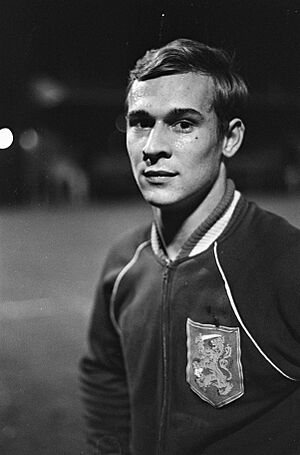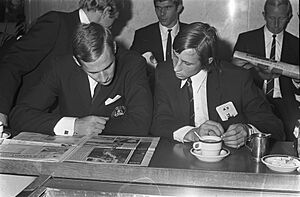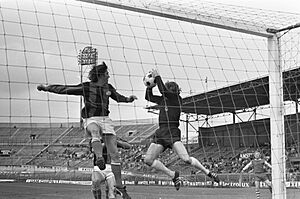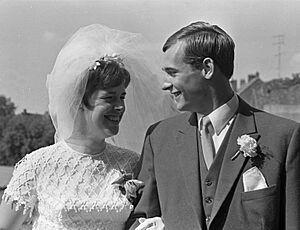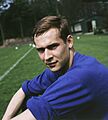Jan van Beveren facts for kids
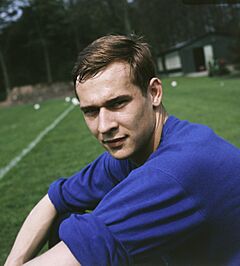
Van Beveren in 1968
|
|||
| Personal information | |||
|---|---|---|---|
| Full name | Jan van Beveren | ||
| Date of birth | 5 March 1948 | ||
| Place of birth | Amsterdam, Netherlands | ||
| Date of death | 26 June 2011 (aged 63) | ||
| Place of death | Beaumont, Texas, United States | ||
| Height | 6 ft 2 in (1.88 m) | ||
| Position(s) | Goalkeeper | ||
| Youth career | |||
| 1959–1963 | VV Emmen | ||
| Senior career* | |||
| Years | Team | Apps | (Gls) |
| 1963–1965 | VV Emmen | ||
| 1965–1970 | Sparta Rotterdam | 101 | (0) |
| 1970–1980 | PSV Eindhoven | 291 | (0) |
| 1980–1983 | Fort Lauderdale Strikers | 110 | (0) |
| 1984–1986 | Dallas Sidekicks | 33 | (0) |
| Total | 535 | (0) | |
| International career | |||
| 1967–1977 | Netherlands | 32 | (0) |
| *Club domestic league appearances and goals | |||
Jan van Beveren (born March 5, 1948 – died June 26, 2011) was a famous Dutch footballer and coach. He played as a goalkeeper, known for his amazing saves.
Van Beveren was born in Amsterdam, Netherlands. As a teenager, he moved to Emmen. He started playing for an amateur team called VV Emmen in 1963. Two years later, he joined Sparta Rotterdam. In 1970, PSV Eindhoven bought him. With PSV, he won many important titles. These included three Eredivisie championships, two Dutch cups (called the KNVB Cup), and the UEFA Cup in 1978.
In 1980, Jan moved to the United States. He played for the Fort Lauderdale Strikers for three seasons. After that, he played indoor soccer for the Dallas Sidekicks. He retired from playing football and lived in Texas. Later, he coached young players at different clubs. He passed away at 63 years old.
Jan van Beveren played 32 matches for the Netherlands national team. He was a top choice for the team in the late 1960s. However, his international career ended early. This was because of a long disagreement with another famous player, Johan Cruyff. Because of this, Van Beveren did not play in the 1974 FIFA World Cup. He stopped playing for the national team in 1977.
Contents
Early Life and Football Beginnings
Jan van Beveren was born on March 5, 1948, in Amsterdam. He spent his first few years there. His father, Wil van Beveren, was a sprinter. He even competed in the 1936 Olympic Games. Jan's mother was also a regional athlete.
Jan started playing football as a goalkeeper when he was only three years old. He played with his older brother, Wil. Their first football games were near the Olympic Stadium. In 1958, the Van Beveren family moved to Emmen. There, Jan and Wil joined an amateur club called VV Emmen. Jan started in a lower youth team. But his talent was clear, and he quickly moved up to higher teams.
He played his first game for Emmen's main team when he was 15. A year later, Van Beveren wanted to play for a professional team. He wanted to join Sparta Rotterdam, where his brother Wil had already gone. The Emmen club did not want him to leave. Even when Jan stopped school and went to Rotterdam, the club took months to sign the papers. This stopped him from playing for a while.
Professional Club Career
Playing for Sparta and PSV Eindhoven
At Sparta, Jan van Beveren trained with coach Wiel Coerver. This coach helped him a lot to become a better player. They often trained together three times a day. Van Beveren started in Sparta's under-19 team. But he quickly became the main goalkeeper, even better than Pim Doesburg. With Sparta, Van Beveren's team finished in fifth place twice. In his last season, this spot allowed them to play in the Inter-Cities Fairs Cup.
In 1970, Van Beveren wanted to join an even bigger club. Many famous clubs like Ajax, Feyenoord, Real Madrid, and PSV Eindhoven tried to sign him. Real Madrid could not sign him because the Spanish league did not allow foreign players at that time. Of the other clubs, only PSV could pay what Sparta and Van Beveren wanted. The transfer fee was a lot of money: 1 million Guilder.
When Van Beveren joined PSV, he again took the main goalkeeper spot from Pim Doesburg. In his first season, PSV reached the semi-finals of the European Cup Winners' Cup. But they lost to Real Madrid. In the next years, Van Beveren became PSV's most important goalkeeper. In 1973, he signed a new seven-year contract with the club. Later in 1973, Van Beveren hurt his groin during a match against Ajax. Even though it hurt a lot, he stayed on the field. This injury stopped him from playing for the rest of that season. PSV won the KNVB Cup that year.
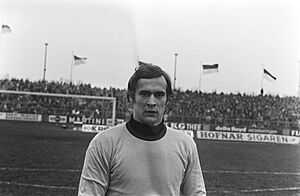
For the 1974–75 season, Van Beveren was healthy again. He was chosen as the team's captain. PSV reached the Cup Winners' Cup semi-finals again. They also won the Eredivisie, which was Van Beveren's first league title. The next year, they won the "double" (both the league and the domestic cup). That season, Van Beveren and PSV almost reached the European Cup final. They lost by just one goal to AS Saint-Étienne in the semi-finals.
The 1977–78 season started with bad luck for Van Beveren. He hit the goalpost in a friendly match and got a concussion. After he returned, he and PSV had their best season ever. They won the Eredivisie, the domestic cup, and the UEFA Cup. In the UEFA Cup final, Van Beveren did not let any goals in during both matches. PSV won 3–0 overall, and Van Beveren lifted his first and only European trophy.
An event in 1978 made Van Beveren want to leave the Netherlands. He had a public disagreement with Johan Cruyff throughout his international career. Many people supported Cruyff. When Van Beveren was asked to be a TV expert for a 1978 FIFA World Cup match, the TV channel received many threats against him and his family. His TV appearance was cancelled. That night, Van Beveren decided to leave the Netherlands for good. But his contract with PSV still had two years left, which he had to finish. When his contract ended in 1980, PSV offered him a new one. But Van Beveren said no. He wanted to move to the United States. Another reason for him to leave was that he disagreed with how coach Kees Rijvers was made to leave PSV.
Playing in the United States
Earlier, Olympique Marseille and the New York Cosmos were interested in Van Beveren. But he chose to play for the Fort Lauderdale Strikers. His friend Cor van der Hart was the coach there and convinced him to join. Van Beveren played his first game in June 1980. It was a 4–0 win against the San Jose Earthquakes. He quickly became the main goalkeeper for the Strikers. In his first season, his team reached the 1980 North American Soccer League Soccer Bowl.
He stayed with the club for three years. They played in the North American Soccer League (NASL). The NASL stopped in 1983, so Van Beveren did not have a club. In April 1984, he started playing indoor soccer. He joined the Dallas Sidekicks. This was Van Beveren's second time playing indoor soccer. He had played one indoor match for the Fort Lauderdale Strikers in 1981. Van Beveren was the first player ever signed by the new Sidekicks team. His first season was tough. He lost 22 of the 30 matches he played, and the Sidekicks finished last in the league. In the 1985–86 season, he played three more games before leaving the club in February 1986.
International Career with the Netherlands
Jan van Beveren played only 17 professional games before he joined the Netherlands national football team. He was only 19 years old. His first match was a 3–1 win against the Soviet Union. In the years that followed, Van Beveren became the main goalkeeper for the national team. But he was not happy playing with some players from Ajax and Feyenoord. He felt they were not motivated enough because they could earn more money and success with their clubs.
After failing to qualify for the 1970 FIFA World Cup, Van Beveren spoke out. He said, "we lost because some players didn't want to try hard. They only talked about money. If you play for your country, who cares about money?" In the Euro 1972 qualification, Van Beveren played in six matches. But the Netherlands did not qualify again. For the 1974 World Cup, he played four qualification matches. However, a groin injury kept him from playing in the final matches.
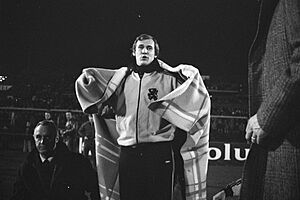
Weeks before the World Cup, Van Beveren was almost fully recovered. Coach Rinus Michels tested him in a friendly match. Van Beveren wanted to play only one half, but Michels refused. He sent Van Beveren home, saying he lacked "character." So, Jan Jongbloed played in goal for the World Cup instead.
Behind the scenes, Van Beveren had another problem. There was an issue with how sponsorship money was shared. For the World Cup, the Royal Dutch Football Association (KNVB) decided to give more money to Johan Cruyff, Johan Neeskens, Willem van Hanegem, and Piet Keizer. The other players got less. When Van Beveren found out, he told the team. After this, Cruyff put pressure on Michels and the KNVB to remove Van Beveren from the team.
After the World Cup, Van Beveren returned to the national team. But his disagreement with Cruyff continued. Cruyff had a lot of power because of the success of "Total Football" by Ajax and the national team. Most players who supported Cruyff in the national team were managed by his father-in-law, Cor Coster. But Van Beveren did not want to follow Cruyff, which Cruyff found insulting. Cruyff's group, supported by coach George Knobel, started to bother Van Beveren and the other PSV players. Some of them thought about leaving the team, but Van Beveren convinced them to stay.
In October 1975, the Dutch team lost a qualification match against Poland 4–1. After the game, Cruyff publicly blamed the PSV players for the loss. Van Beveren criticized Cruyff's superstar behavior. Before the Poland match, Cruyff decided to arrive at training a few days late. When Cruyff showed up, Willy van der Kuijlen openly criticized him. This made Cruyff angry, and he went to coach Knobel. He forced Knobel to choose between him or Van der Kuijlen and Van Beveren. Knobel chose Cruyff. On October 13, Van Beveren and Van der Kuijlen decided to leave the national team.
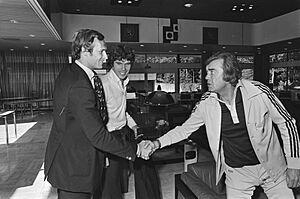
Van Beveren refused to play for the national team after these events. So, he missed UEFA Euro 1976. He only played one more time for the national team. In 1977, coach Jan Zwartkruis convinced him to play in a qualifying match against Iceland. This was his last match for the national team. Before the 1978 World Cup, Van Beveren was often left on the bench during matches. When he asked Zwartkruis about this, the coach said, "Jan, I'm just being told what to do." This made Van Beveren decide to retire from international football for good.
Playing Style and Skills
Jan van Beveren was known as a goalkeeper who usually stayed close to his goal. He relied on his quick reflexes to catch the ball when it was shot at him. A journalist named Matty Verkamman said his style was "graceful and elegant; athletic and calm." His reflexes were thought to be his best skill.
Writer David Winner wrote in the New York Times that Van Beveren was "a wonderfully agile 'line keeper,' a shot stopper of the old school."
Van Beveren himself once said, "I could not play football, I was a born goalkeeper. Reflexes, jumping, strength; people are born with it." He was good with both hands and could kick the ball well with both feet.
Life After Football
After he stopped playing football, Jan van Beveren stayed in Texas. He tried to start a business selling collectible postage stamps, but it did not work out. He also worked as a goalkeeping coach at the Dallas Texans Soccer Club. In December 1999, Johan Cruyff invited him to play in a special match called the "Game of the Century." This game featured the best Dutch players ever against the best foreign players who had played in the Eredivisie.
In 2007, he became the training coordinator for the Spindletop Select Soccer Club in Beaumont, Texas. He trained young players aged 9 to 18 there.
Jan van Beveren passed away on June 26, 2011, at his home in Beaumont, Texas. He was 63 years old and died from a heart attack. The Spindletop Select players honored him two days later. PSV Eindhoven also remembered Van Beveren during an Eredivisie match in December 2011. On that day, a sculpture of Van Beveren was also shown at the Philips Stadion.
Jan van Beveren married Petra Warringa on August 26, 1968.
Awards and Achievements
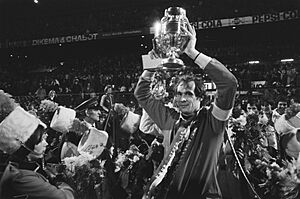
Club Achievements
- PSV Eindhoven
- Eredivisie (3 times): 1974–75, 1975–76, 1977–78
- KNVB Cup (2 times): 1973–74, 1975–76
- UEFA Cup (1 time): 1977–78
Images for kids
 | Ernest Everett Just |
 | Mary Jackson |
 | Emmett Chappelle |
 | Marie Maynard Daly |


